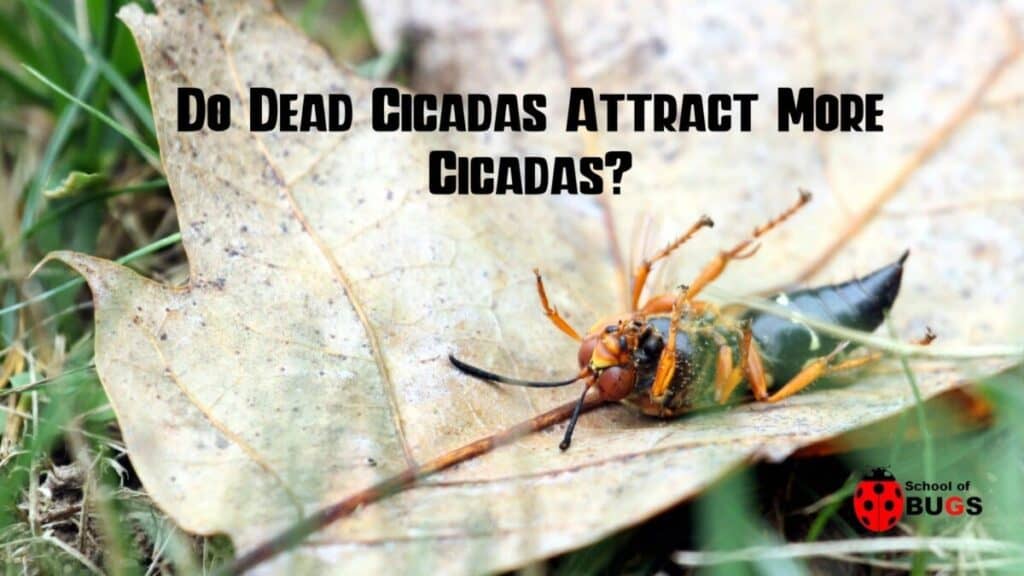
Cicadas are one the more interesting insects, mostly because of things that are assumed about them, rather than reality.
A lot of myths and superstitions surround the cicada and some are genuinely terrified of them. As to what they are attracted to, that’s a mixed bag of reality versus myth as well.
Contrary to popular belief, Cicadas are not attracted to their dead. Dead cicadas don’t give off pheromones that magically call thousands of buzzing cicadas to the side of their corpses.
A dead cicada gives off the smell of a dead cicada and draws a lot of ants. That’s about it.
For the most part, cicadas are cyclical creatures, emerging from their dormant state, deep within the earth, every seventeen years.
However, not all cicadas are 17-year cicadas, with several species termed, Periodical Cicadas.
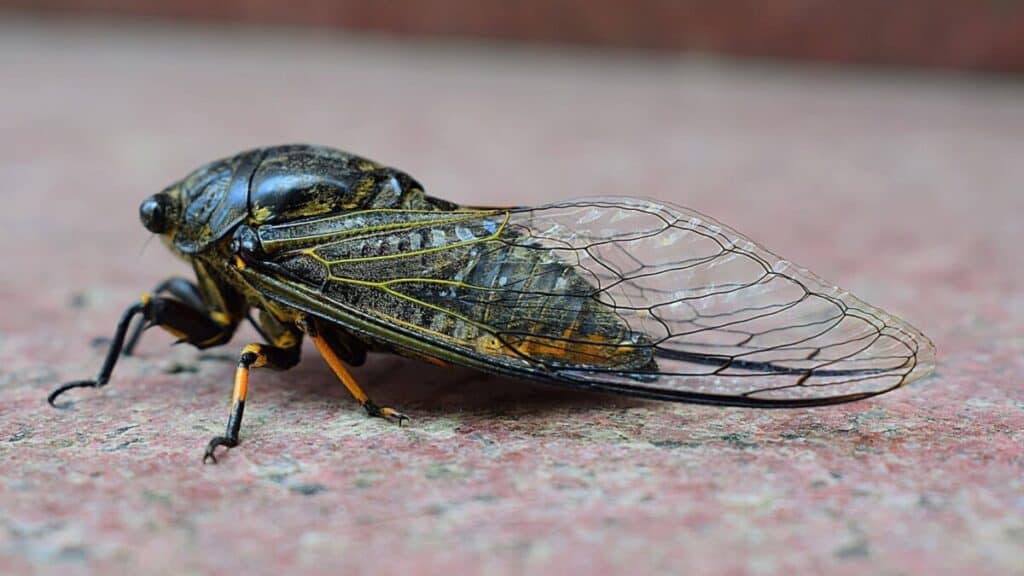
Regardless of what you may or not believe about cicadas, we’re going to cover the following:
- Types of cicadas and what attracts them
- Why do cicadas go dormant for 13 or 17 years
- Whether or not cicadas are truly dangerous
- How long do cicadas live for
- How to get rid of cicadas.
- How to prevent cicadas
Types of Cicadas and What Attracts Them
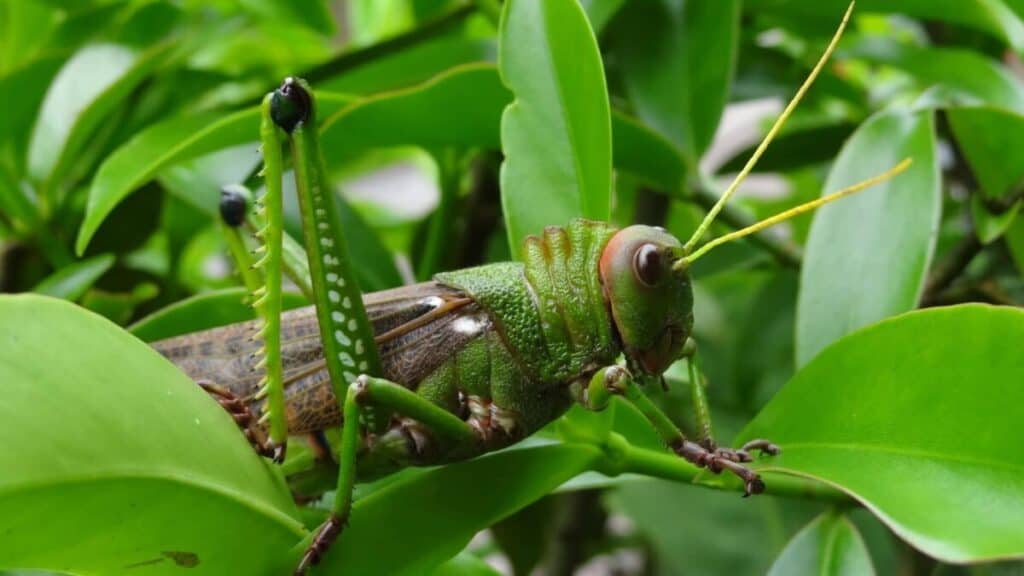
There are also 13-year cicadas and within the group or species that encompasses all cicadas, there are seven types: Magicicada Cassini, Magicicada Septendecula, Magicicada Septendecim, Magicicada Neotredecim, Magicicada Tredecassini, Magicicada Tredecim, and Magicicada Tredecula.
Some of these types belong to one group or another but they mainly belong to different broods. Some of those broods have already emerged from their underground state and many more are yet to come.
17-Year Cicadas
| Brood I | 2029 |
| Brood II | 2013 |
| Brood III | 2014 |
| Brood IV | 2015 |
| Brood V | 2016 |
| Brood VI | 2017 |
| Brood VII | 2018 |
| Brood VIII | 2019 |
| Brood IX | 2020 |
| Brood X | 2021 |
| Brood XIII | 2024 |
| Brood XIV | 2025 |
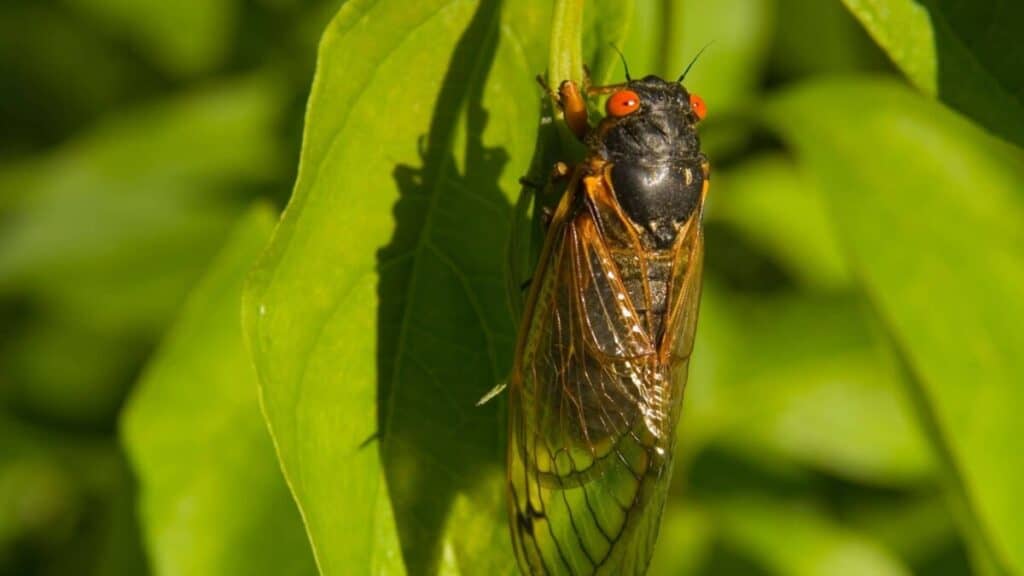
13-Year Cicadas
| Brood XIX | 2024 |
| Brood XXII | 2014 |
| Brood XXIII | 2015 |
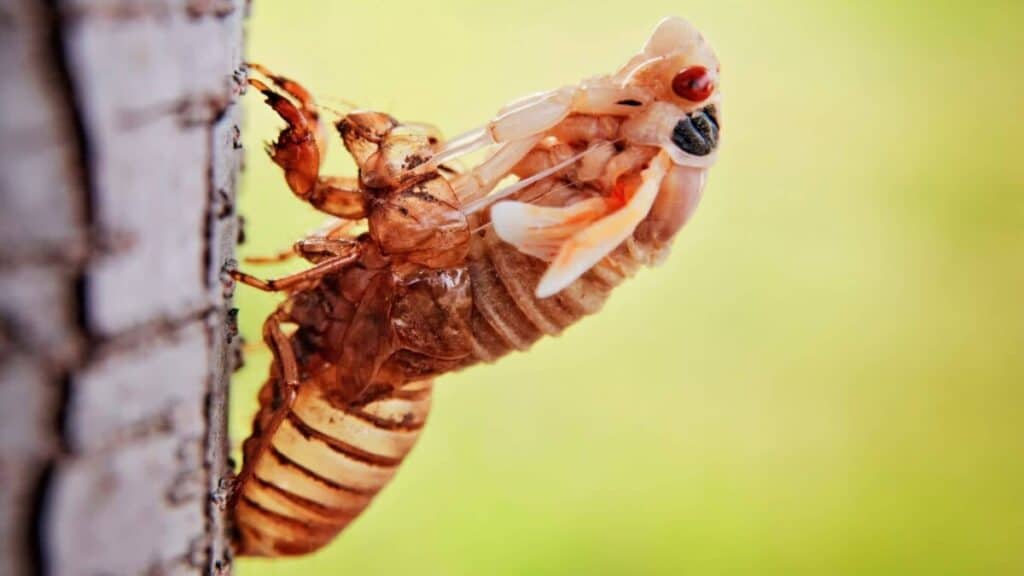
These broods are calculated in their respective cycles, 17 years for one group and 13 years for the other.
However, some cicadas don’t stick to the program and emerge at random times throughout the years. These cicadas are known as stragglers.
Attractions: Loud, Buzzing Sounds
When the cicadas come around in their 17 and 13-year cycles, it’s time to be a little concerned about cranking up the lawnmower.
While cicadas aren’t in the least bit attracted to their dead brethren, a lawnmower is a different story altogether.
If you crank up the lawnmower, you may be surprised to find yourself inundated with cicadas from all directions.
They land on your head, shoulders, hands, feet, lawnmower wheels, the hood or the handle if you’re driving or pushing, and all around it as well.

The thing is, the males are curious and the females just flat out want to mate with you.
Of course, when they discover that there’s nothing but a really loud, confusing object that moves, waiting for them, instead of the loudest and most virile male they’ve ever heard, they grow a bit confused.
Cicadas are attracted to the lawnmower because it sounds like them but much, much louder. The female cicadas are highly attracted to what must be the best male to mate with on the planet.
It’s not just lawnmowers either, as you will quickly discover. Anything that is loud and vibrating, such as power tools, leaf blowers, power washers, air compressors, lawnmowers, AC units, chainsaws, hedge clippers, we could go on and on, but you probably get the point.
It can be a point of contention and frustration during the cicada season, so the best thing that you can do is get your lawn and yard work done when cicadas are far less active, such as right at dusk and early in the morning, just as the sun is touching the horizon.
You still might get a few “visitors” but it won’t be nearly as bad as it is during the regular hours of the day.
Why Do Cicadas go Dormant for 13 or 17 Years?
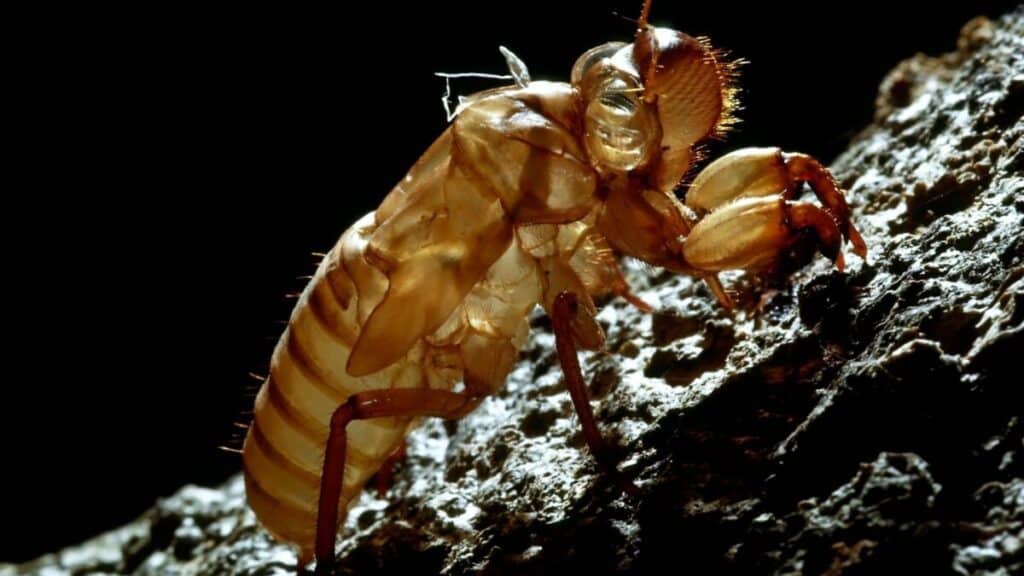
The Great Eastern Brood, otherwise known as Brood X, otherwise known as Brood 10, emerged in 2021 and was comprised of three, different broods.
Seventeen years had passed and what sounded like an endless buzzsaw from hell poured out of the ground.
Seventeen years prior, millions of female cicadas dropped eggs onto the ground from the heights of the trees in which they inhabited.
Many of those eggs never left the tree and in roughly 60 days, they all began to hatch, whether the newborn cicada larvae were on the ground or falling out of the trees.
Either way, they all end up on the ground, digging down and down in the dark earth until they reach the life spring of the tree, its roots.
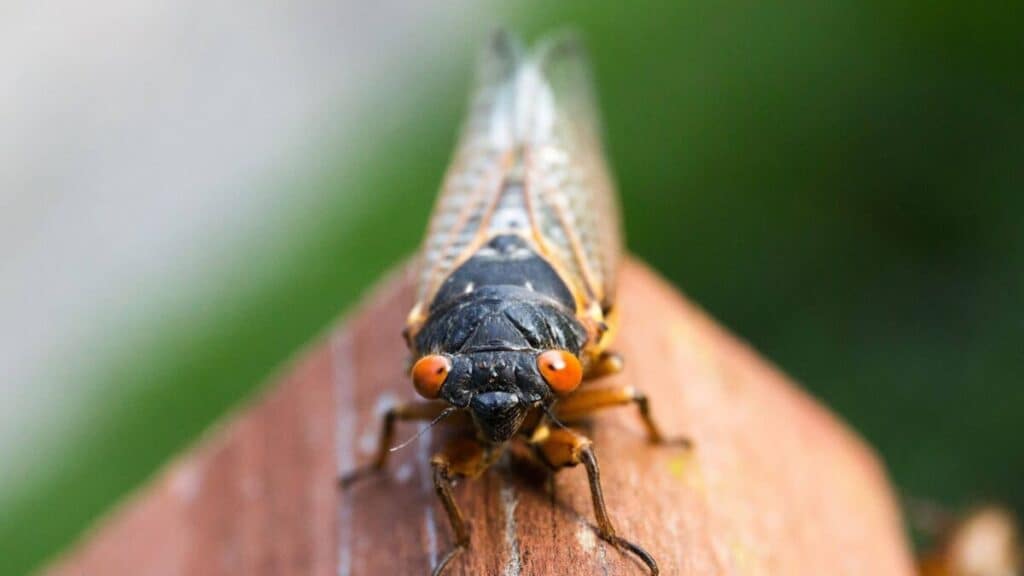
Once there, they begin to feed on the warm, sticky sap, drawn directly from the roots of the tree.
There they stay, growing from the larvae to the nymph, and ultimately, to the adult cicada, where they will emerge in seventeen years to pester farmers, gardeners, and those who just want to catch a good night’s sleep.
The “why” of 17 and 13 years isn’t exactly something that science has conclusively answered.
There are those who believe that it has something to do with the association of prime numbers and predation during those, specific time periods, with predators supposedly being fewer in number.
How Long Do Cicadas Live For?
Their years underground don’t count, as what they do to survive down there is still a bit of a mystery.
Once they emerge, however, adult cicadas don’t generally live longer than four weeks. By that time, they will have been eaten, become roadkill, or just flat out died.
Since their lifespan is so short, the males and females are constantly seeking to mate and once the female is ready, she can lay up to 600 eggs, which makes sense, given the death rate amongst cicadas, once they emerge from the earth, is exponentially high.
How to Get Rid of Cicadas

Young trees and small trees are the ones that are most at risk during the cicada season.
Since they draw the sap out of the roots and eat the leaves, it is simply too much of a shock for the smallest and the youngest of trees to survive the process.
If you want to protect trees, bushes, your garden, and/or any other potentially endangered plant life on your property, it’s best to prepare well for the cicadas.
Landscape netting is your number one option and it should cover everything that you want to protect.
You may not be too fond of insecticides, but it’s almost a must for this uncommon event. Using a garden hose, cover your garden with Sevin Bug Killer, or something similar. For your trees, Reclaim IT.
In most cases, you will slaughter them by the score, however, you will inevitably have to go outside, every day, and pick the individual survivors off of your plants, trees, and garden plants, one by one.
If you cover everything appropriately, you will kill thousands of them and that is a good thing for your plant life because you can convert their dead bodies into compost and use the things that were once such a threat to your garden, for the exact opposite.
How to Prevent Cicadas
Sadly, there’s nothing you can do to prevent cicadas. Unless we cover the entire planet in a parking lot, they will come, as inevitable as the sun rising in the east and setting in the west.

What you can do, is adequately prepare yourself for the onslaught.
- Trim back and prune all of your shrubs and trees
- Spray down your yard with insecticides
- Cover up all of your water sources
- Don’t plant anything new
- Hire a professional
Trimming and pruning your trees and shrubs will make your property less accessible and less attractive to cicadas because it limits their egg-laying options.
Fewer egg-laying options equal fewer cicadas lingering in your yard.
Spraying down the yard and trees was mentioned above and as they come in they will die and continue to die for the longevity of the pesticide.
Covering up your water sources keeps them from having a source of water, from contaminating your water, and from filling up your swimming pool and/or jacuzzi with their lifeless bodies.
Don’t plant anything new for obvious reasons, as the cicadas with only harvest the things and destroy them utterly. Last but not least, hire a professional if you think it’s all a bit too much.
They’ll be able to prep your lawn as well as convey some valuable advice and information on what’s to come.
All Things Considered
Cicadas are certainly not attracted to their dead, but they are attracted to just about everything else that matters.
From all of the things that make loud, vibrating noises, to the bark, leaves, grass, and shrubs in your yard, there is plenty for a cicada to love and want, right next to your front door.
Alright, that’s it for this article, here are a few hand-selected articles that you might also find interesting reads:
Do dead cockroaches attract more cockroaches? Well…Yes and NoWhy Do Dead Flies Attract More Flies?
Do Dead Spiders Attract MORE Spiders? This Surprised Me
Recent Posts
Tiny Black Bugs in Bathroom NO WINGS: What They Are and What to Do!
Finding tiny black bugs in your bathroom can be uncomfortable, to say the least. Especially if they are persistent, or they appear in very large numbers, which they often like to do. When it...
Tiny Black Bugs in Plant Soil - What Are They & What To Do About It
A short horror story: You get a new houseplant. You do your best to take care of it. You’ve ensured that it has the right soil, the right amount of sun, it gets enough water. And then one day, you...

